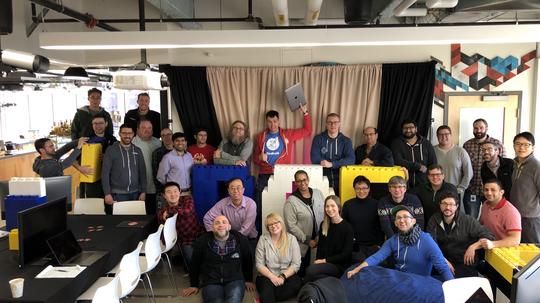
Who's behind Facebook's most popular location tracking products? The answer is right in your backyard: just head to the company's Boston office and ask for Yoav Shapira.
Since 2016, Shapira’s been an engineering manager at Facebook’s Boston-area office, where his team builds location tracking products such as Safety Check and Find Wi-Fi.
Safety Check, which allows users to mark themselves as safe in case of disaster or attack, officially launched to users in 2014. Since then, it was activated by the company multiple times, but it also attracted criticism for not being available at all times, including a 2016 attack in Côte d’Ivoire. More recently, Facebook launched Find Wi-Fi to help users find public Wi-Fi networks nearby.
Shapira's role at Facebook Boston is only on top of a career of – as he puts it – being a serial entrepreneur active on the Boston tech scene. His work includes building up the product and engineering teams at Jana, being on the first executive team at HubSpot and helping develop CarGurus. Over recent years, he’s been an adviser for a long list of local startups and companies such as QuikForce, Entromy and Sentenai. On top of that, he’s also attended MIT and Boston University, traveled the world and played bizarre sports.
BostInno spoke with Shapira on his work at Facebook, where his team also works on safety and security, and, of course, to find out what weird sports he’s into.
BostInno: You have a daughter, when she’s old enough to ask, 'Daddy, what do you do for work at Facebook?' what would you tell her, in simple terms?
Shapira: I do have a daughter and she is two-and-a-half-years old, and what I would tell her is, "Check out how her great grandma, and my parents, use Facebook and WhatsApp and Instagram to keep in touch with each other." That’s actually one of the reasons I joined Facebook, is because it is actually the only set of apps that my 86-year-old grandma and my parents who are in their 60s use. I don’t know if you’ve ever seen “My Big Fat Greek Wedding,” but they all live in the same neighborhood. My family is exactly the same – they are all close to each other, but … they rely on tools like WhatsApp and Facebook to keep in touch.
BostInno: And your family – parents and grandparents – are all in Israel, right?
Shapira: Yes.
BostInno: These features that you talked about rely on location tracking. Obviously, there’s a lot of talk lately about privacy and Facebook. How do you see the balance between providing an app like Safety Check and privacy concerns?
Shapira: We obviously take this topic very seriously. Every single one of these (location) features … is on an opt-in basis. People can choose to opt-in or opt-out at any time…. We take that very seriously, but one thing we do all the time to keep our product valuable, is we talk to users. We ask: “What would be valuable to you, what would not be valuable to you? What would be an OK trade-off? Are you getting an OK value exchange?” We won’t build stuff if people don’t find it valuable. There’s no point to it. At the same time, what might be OK for one person, might not be OK for another, so that’s why our opt-in controls are very granular.
BostInno: Talk about these functions – how they work behind the scenes – that might surprise people.
Shapira: We are a full a stack team (in Boston), meaning that everything from the software that runs on a phone, like Facebook’s … apps, down to back-end, where the data is stored, we take care of. So, for some really simple examples, we make sure that our app works without a lot of battery drain, even on older phones, the kind of phones that are used in other parts of the world that might be a few years behind in technology. … And, as the data is passed downstream, we make sure it’s compliant with all the encryption requirements and things like that. And scale, that’s a pretty difficult thing to ensure you do correctly, so we also have other teams of engineers who try to attack our code and find deficiencies and make sure that everything is bulletproof.
We can also do capacity planning, meaning, how many people do we predict will be using these features or these parts of Facebook or the app …. in the future? To make sure we have enough servers. We collaborate with folks such as Google and Apple on location trends on their platforms, to make sure we’re ready for that. And the whole thing is done with an eye toward building communities, what would bring people together.
For example … with Find Wi-Fi, we thought originally, ‘OK, it would be cool to connect with Wi-Fi,’ and users said, ‘Yes, that is very valuable, thank you very much for building it.’ But as it turns out, often times, the best Wi-Fi is in your little local coffee shop, or other businesses. So, we’re driving more people to businesses in their local neighborhood, which means they might not have visited them before, but it’s another form of supporting your local community that we really like. The way that translates to the product, behind the scenes, is Facebook has this really nice advantage in that many small businesses have this Facebook page. If they list their Wi-Fi … they can show up and drive more foot traffic to their businesses. We can create these nice feedback loops. We talk about that a lot from a product perspective….
I can give you another example…. Nearby Friends, it notifies you when your friends are nearby. … The original scenario that we planned it for, was, I live in Boston, and I visit London every once in a while. I forget which of my friends lives there. So, wouldn’t it be cool, if you tell me when I get off the plane in London, “Hey, so-and-so is town.” And, I haven’t seen him in five years; I want to grab coffee with him. It totally works for that. But then we started seeing patterns of people to notify or not notify. For example, you probably don’t need to be notified that your wife is nearby.... We use machine learning to filter things like that out, and to personalize the experience for different people, so that based on their patterns, they can get valuable notifications that connect them with the friends they want, and that’s all built here in Boston.
BostInno: A couple years ago, you wrote a post about moving from the venture capital side of things, to becoming an engineer manager. Looking back on that, what is it like to be in a more corporate environment?
Shapira: I have been really pleasantly surprised with how entrepreneurial Facebook is and how much autonomy is given to individuals and teams. The autonomy to choose what you should work on and how you should work on it, and what the goals and metrics should be, has been an awesome surprise. I enjoy it. It doesn’t feel that much different from some other places I’ve worked in that regard. What is different is … working for two billion-plus users is a very different challenge. At times, it can be intimidating but it’s also very intellectually stimulating. I welcome it and really like it.
BostInno: Around the time you decided to join Facebook, your daughter was born. How has raising a child changed your perspective on your career or what you view as your approach to work?
Shapira: It’s funny you ask, because one of my filters before joining Facebook was … that I wanted to join a place that not only had an impact at a global scale … but also that works on products that my friends and family could use. At past places that I worked, we built products that solved problems and the company did well. That was cool. This is the first time that I can show off … to like my grandma, my parents. And, yeah, I get more tech support questions at family gatherings, but that’s OK. And they report bugs and tell me what features they use. It’s been the proudest I’ve been in my career.
BostInno: Going back to privacy issues, when do you think your kid will be old enough to have her own Facebook page?
Shapira: I don’t know. I would probably do the wise thing and defer to my wife.
BostInno: You said you’ve lived on-and-off in Boston for about 26 years. What have you seen going on here in Boston in terms of technology innovation?
Shapira: The latest thing, I think you’re starting to see is some of the bigger tech companies, like Facebook, like Amazon, like Google, all our friends, doubling-down and tripling-down on their offices here, whereas for many years this wasn’t a focus area. They recognize there’s a lot of talent here. There’s this healthy flow – people go to startups, they take risks, some of them work out, some don’t, people go to big companies, some like it, some don’t. There’s this healthy flow of people who go back and fourth and cross-pollinate ideas.
BostInno: Lastly, on your LinkedIn page, you say you’re into running and some not-so-common sports. What are they?
Shapira: I like strange sports… Do you know what chess-boxing is? Alternating three-minute chess, three-minute boxing… I’m helping tryout an underwater variant of it… Because I like running, but I’m a slow runner, I’ve looked for ways to compensate for that. So, there’re these races called adventure races, kind of like eco-challenges used to be in the 1990s. You have to navigate the next point on a map. I’m a good navigator and a slow runner, so that works out well. We actually hired a couple Boston engineers who are into that, too. If there’s a strange sport, I’m into it. Inner-tube water polo is a great activity…
This interview has been edited for clarity and length.








